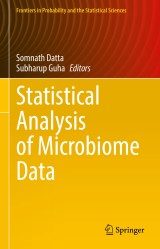Details

Statistical Analysis of Microbiome Data
Frontiers in Probability and the Statistical Sciences
|
117,69 € |
|
| Verlag: | Springer |
| Format: | |
| Veröffentl.: | 27.10.2021 |
| ISBN/EAN: | 9783030733513 |
| Sprache: | englisch |
| Anzahl Seiten: | 346 |
Dieses eBook enthält ein Wasserzeichen.
Beschreibungen
<p>Microbiome research has focused on microorganisms that live within the human body and their effects on health. During the last few years, the quantification of microbiome composition in different environments has been facilitated by the advent of high throughput sequencing technologies. The statistical challenges include computational difficulties due to the high volume of data; normalization and quantification of metabolic abundances, relative taxa and bacterial genes; high-dimensionality; multivariate analysis; the inherently compositional nature of the data; and the proper utilization of complementary phylogenetic information. This has resulted in an explosion of statistical approaches aimed at tackling the unique opportunities and challenges presented by microbiome data.</p>
<p>This book provides a comprehensive overview of the state of the art in statistical and informatics technologies for microbiome research. In addition to reviewing demonstrably successful cutting-edge methods, particular emphasis is placed on examples in R that rely on available statistical packages for microbiome data. With its wide-ranging approach, the book benefits not only trained statisticians in academia and industry involved in microbiome research, but also other scientists working in microbiomics and in related fields.</p><br><p></p>
<p>This book provides a comprehensive overview of the state of the art in statistical and informatics technologies for microbiome research. In addition to reviewing demonstrably successful cutting-edge methods, particular emphasis is placed on examples in R that rely on available statistical packages for microbiome data. With its wide-ranging approach, the book benefits not only trained statisticians in academia and industry involved in microbiome research, but also other scientists working in microbiomics and in related fields.</p><br><p></p>
1. Tree-guided regression and multivariate analysis of microbiome data - Hongu Zhao and Tao Wang.- 2. Computational methods for metagenomic assemblies and strain identification - Hongzhe Li.- 3. Graphical models for microbiome data - Ali Shojaie.- 4. Bayesian models for understanding the modulating factors of microbiome data - Francesco Denti, Matthew D. Koslovsky, Michele Guindani, Marina Vannucci, and Katrine L. Whiteson.- 5. Use of variable importance in microbiome studies - Hemant Ishwaran.- 6. Log-linear models for microbiome data - Glen Satten.- 7. Quantification of amplicon sequences in microbiome samples using statistical methods - Karin Dorman.- 8. TBD - Jeanine Houwing Duistermaat.- 9. Analyzing microbiome data by employing the power of abundance ratios - Zhigang Li.- 10. Beta diversity analysis - Michael Wu.- 11. MicroPro: using metagenomic unmapped reads to provide insights into human microbiota and disease associations - Fengzhu Sun.- 12. Statistical methods for feature selection in microbiome studies - Peng Liu.- 13. A Bayesian restoration of the duality between principal components of a distance matrix and operational taxonomic units in microbiome analyses - Somnath Datta and Subharup Guha.
<p><b>Somnath Datta</b> is Professor of Biostatistics and a preeminence hire in Genomic Medicine at the University of Florida. He is Fellow of the American Statistical Association, Fellow of the Institute of Mathematical Statistics, and Elected Member of the International Statistical Institute. He has contributed to numerous research areas in Statistics, Biostatistics and Bioinformatics.</p>
<p><b>Subharup Guha</b> is Associate Professor of Biostatistics at the University of Florida. His current research areas of interest are Bayesian nonparametric methods, clustering, classification, Markov chain Monte Carlo algorithms, causal inferences, and high-dimensional data analysis. The applications have included cancer genomics, image processing, microbiomics, and connectomics.</p><br>
<p><b>Subharup Guha</b> is Associate Professor of Biostatistics at the University of Florida. His current research areas of interest are Bayesian nonparametric methods, clustering, classification, Markov chain Monte Carlo algorithms, causal inferences, and high-dimensional data analysis. The applications have included cancer genomics, image processing, microbiomics, and connectomics.</p><br>
<p>Microbiome research has focused on microorganisms that live within the human body and their effects on health. During the last few years, the quantification of microbiome composition in different environments has been facilitated by the advent of high throughput sequencing technologies. The statistical challenges include computational difficulties due to the high volume of data; normalization and quantification of metabolic abundances, relative taxa and bacterial genes; high-dimensionality; multivariate analysis; the inherently compositional nature of the data; and the proper utilization of complementary phylogenetic information. This has resulted in an explosion of statistical approaches aimed at tackling the unique opportunities and challenges presented by microbiome data.</p>
<p>This book provides a comprehensive overview of the state of the art in statistical and informatics technologies for microbiome research. In addition to reviewing demonstrably successful cutting-edge methods, particular emphasis is placed on examples in R that rely on available statistical packages for microbiome data. With its wide-ranging approach, the book benefits not only trained statisticians in academia and industry involved in microbiome research, but also other scientists working in microbiomics and in related fields.</p>
<p>This book provides a comprehensive overview of the state of the art in statistical and informatics technologies for microbiome research. In addition to reviewing demonstrably successful cutting-edge methods, particular emphasis is placed on examples in R that rely on available statistical packages for microbiome data. With its wide-ranging approach, the book benefits not only trained statisticians in academia and industry involved in microbiome research, but also other scientists working in microbiomics and in related fields.</p>
Provides a comprehensive overview of cutting-edge statistical approaches for microbiome research Explores the intersection of big data and next generation sequencing technologies Discusses innovative methodology and applications that will be of interest to statisticians as well as non-statistical scientists and advanced students in microbiome research

















